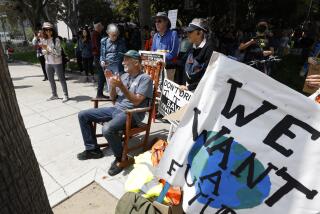‘Science is real,’ marchers in nation’s capital and worldwide declare
- Share via
Reporting from Washington — Scientists and their supporters took to the streets of Washington and other cities around the country and the world Saturday, with many expressing worries about a diminishing role for fact-based research under the Trump administration.
Waving signs with slogans like “Science is Real” and “Ask for Evidence,” the marchers in the nation’s capital gathered under drizzly skies at the base of the Washington Monument, a short distance from the White House. The crowd swelled by the thousands even as the light mist turned into a soaking rain.
The Earth Day event was billed as nonpartisan, with scientists, students, researchers and advocates worldwide seeking to promote the role of science in policymaking and public life.
Organizers encouraged participants to wear work gear such as their lab coats, or to dress as a science hero. Nancy Davis of Baltimore came to the Washington march decked out in full Revolutionary War-era regalia as Benjamin Franklin; she said her chemist sister approved of the tribute to the Founding Father and part-time electricity experimenter.
Marcher Jeanne Walton, 51, an eighth-grade science teacher in York, Pa., said she worried about how some of the current political rhetoric may affect her young students.
“I’m watching science being denied and undermined,” said Walton, who was marching with her 18-year-old son, Trey, a mechanical engineering major at Temple University in Philadelphia. “We’re replacing facts with propaganda.”
Hours before the Washington march, parallel events took place in other time zones. Among the larger events were marches in Berlin, London, Geneva and Sydney, Australia.
More marches took place in other U.S. cities, including Boston and Los Angeles. Arctic scientists tweeted their support from the North Pole.
In Washington, dozens of marchers said they were driven to participate by the across-the-board cuts to scientific research foreshadowed by President Trump’s proposed budget, a summarized version of which was made public last month. It indicated that Trump was targeting, among other things, spending for the National Institutes of Health and government-wide research related to climate change.
The president’s unabridged budget is expected to be submitted to Congress in May.
In a statement issued Saturday afternoon by the White House, Trump took note of Earth Day and defended his policies without referring to the protests.
He said his administration “is committed to keeping our air and water clean, to preserving our forests, lakes, and open spaces, and to protecting endangered species…without harming America’s working families.”
Trump also called for “advancing scientific research that leads to a better understanding of our environment and of environmental risks” and said “we should remember that rigorous science depends not on ideology, but on a spirit of honest inquiry and robust debate.”
At the Washington march, Andrew Cameron, a 52-year-old cybersecurity specialist, recalled what the nation was like before science-driven legislative achievements such as the Clean Air Act were passed.
Cameron, who lives now in Stafford, Va., described his first visit to the Los Angeles area, in 1971 or 1972, arriving by plane in Burbank.
“I just remember the thick brown smog,” Cameron said. “You couldn’t see across the L.A. Basin.”
He credited the improved clarity in subsequent decades to the Clean Air Act, backed by the Nixon administration, and to greater environmental consciousness. He sees Trump’s approach to climate change as anathema.
“If that makes me a hippie, I’ll take that moniker,” Cameron said.
However serious the subject matter, many marchers showed off a waggish side, with science-centered puns abounding on T-shirts and placards. One energetic Labrador retriever sported a sign reading “Science Lab.”
Among the most enthusiastically received speakers addressing the throng was William S. Nye, known to those of a certain age as TV’s nerdy but beloved “Bill Nye the Science Guy.”
Now the chief executive of the Planetary Society, one of the sponsors of Saturday’s demonstrations, Nye took stealthy aim at those elected officials who would reduce federal funding for science.
“Without scientifically literate citizens, the United States — any country, in fact — cannot compete on the world stage,” said Nye, sporting one of his trademark bow ties.
“Our lives are in every way improved by having clean water, reliable electricity and access to electronic, global information. Each is a product of scientific discoveries,” said Nye, 61, who earned his own undergraduate degree in mechanical engineering. “Science brings out the best in us!”
Other sponsors of the D.C. march included the Nature Conservancy, the American Assn. for the Advancement of Science, the United Automobile, Aerospace and Agricultural Implement Workers of America, the American Geophysical Union and the Union of Concerned Scientists.
The demonstrators near the Washington Monument and on nearby streets traveled from the surrounding suburbs — and around the nation.
L. Kraig Steffen, an associate chemistry professor at Fairfield University in Connecticut, said he made the trip to emphasize the value of science.
“We’re eating our seed corn if we don’t pay for basic research,” Steffen said.
Bob Kabakoff, 61, drove from Oxford, Ohio, to attend a protest for the first time in his life, he said, adding that he was motivated to attend by his local Republican congressman’s stance on climate-change-related policies.
“I am really upset,” said Kabakoff, who described himself as a retired machine-maintenance supervisor who helped make vehicles for Ford and General Motors.
Kabakoff stood next to a friend who held a sign saying: “You are the result of 4 billion years of evolutionary success. ACT LIKE IT!’’
Kathy Platt, a retired scientist from Southern California’s Inland Empire, said urgent concerns had prompted her to make the trip to the Washington march.
“My biggest concern is for the [Paris] climate agreement, and science in general,’’ said Platt, 69, who said her careerlong work as a laboratory researcher at UC Riverside was supplemented with funding from the National Science Foundation.
Another Californian, UC Davis physics professor Steven Carlip, pointed to perhaps a more immediate concern.
“I have students who aren’t going to have funding next year because of these enormous budget cuts,” said Carlip.
Nearby, 18-year-old Patrick Ramsey of Round Hill, Va., who said he will enter Purdue University this year, voiced a related concern.
“I’ve known since I was a couple months old that I wanted to be in some kind of engineering,” Ramsey said. “Now I’m two months away from college … and I want there to be a job there in four years.”
ALSO
Another doctor, and his wife, arrested in genital mutilation case
Arkansas carries out first of several planned executions, but what’s next?
Supply ship named for John Glenn arrives at space station
More to Read
Sign up for Essential California
The most important California stories and recommendations in your inbox every morning.
You may occasionally receive promotional content from the Los Angeles Times.











